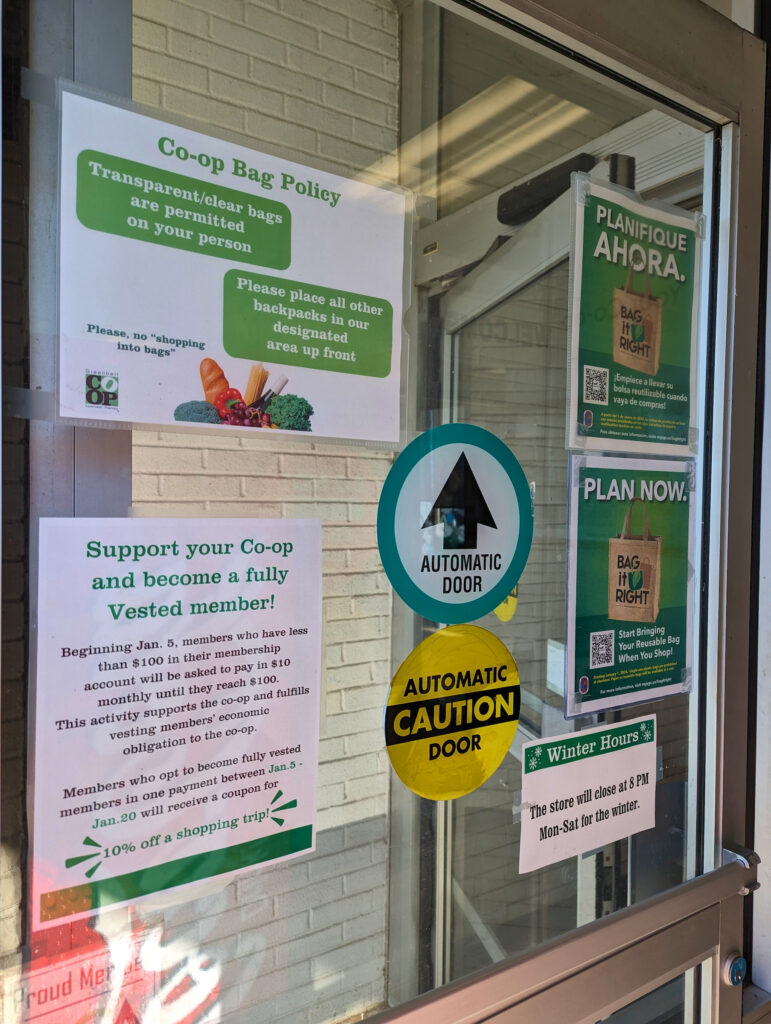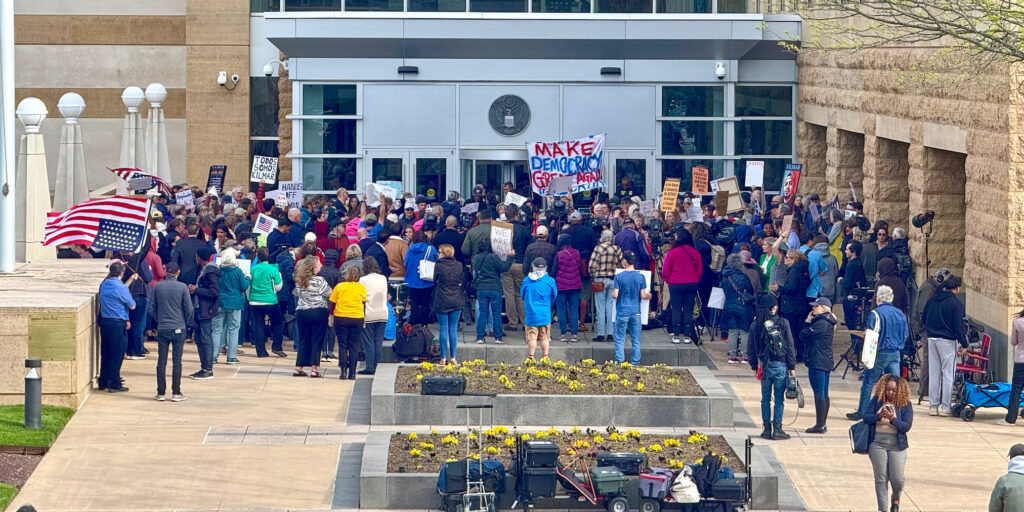The Greenbelt Co-op Supermarket and Pharmacy is asking members to invest $100 in the co-operative. It’s a return to the original intention of members investing at this level, says General Manager Dan Gillotte. There are now signs in the Co-op and cashiers have begun to ask customers if they would like to add $10 to their account if they are not yet fully vested. This follows discussion at the grocery store’s last annual meeting, as reported in the November 9, 2023, issue of the News Review.
Vested Membership
The bylaws of the Co-op outline two stages of membership, fully vested and subscribing, the intention of the latter being in the process of becoming fully vested, says Gillotte. Yet at some point the original $10 investment to become a member became the “operational shorthand,” and for many members it ended there, he says. “Subscribing members should be actively working towards becoming vested members not a second kind of static, quasi-membership,” stresses Gillotte. All along, the Co-op should have been expressing the “real need for it to be funded by its members to a reasonable amount,” he told the News Review. Gillotte believes there was a misinterpretation some years ago that “subscribing member” means a $10 membership, rather than an initial $10 working towards $100.
Part of the reason the change is coming is that the technology is now available to easily track members’ investment levels as a feature of the new Point of Sale system. Cashiers will now ask members to add $10 to their account each month until they reach that $100 investment level. Most co-ops in the country and the nearest co-op, in Takoma Park, require $100 as membership, notes Gillotte.
Equity vs Fee
The $100 investment from each member is not a membership fee. It’s equity. It’s not considered taxable income for the Co-op and it’s refundable if a member moves or dissolves their membership. It’s also a one-time investment amount that members can make at once or work towards incrementally. Gillotte likens it to a share in a credit union.
Impact for the Co-op
“Having this extremely low membership [investment] isn’t productive for the Co-op and it is very out of line with most food co-ops and, is really just, frankly, a mistake.” Investor-owned businesses get cash infusions by selling a stock and a private corporation might have a few people investing a million dollars, says Gillotte. “These equity payments that people pay in is really the way that our Co-op gets funded on the owner side, so as members or owners, they’ve got to fund the joint. And we do that by this $100, from thousands of people, instead of thousands of dollars from hundreds of people … a lot of people putting a little bit of money and that’s what we’re trying to do here.” Gillotte estimates that the Co-op is missing around $100,000 of equity from members not vested or actively subscribing. He also anticipates bringing in more members through attractive rewards and future membership drives. “Any business needs more members and capital coming in than leaving,” he points out.
This “one-time correction of how we’re dealing with member capital will get us a good foundation on our balance sheet,” says Gillotte. The capital will help with regular everyday cash flow and be leveraged for future projects. “If we wanted to go to a bank for money, we [can show we] … have $20-$30,000 in member equity on our balance sheet. So, the members have clearly demonstrated their commitment,” explains Gillotte. “Member equity is one piece of the overall financial foundation that lets you do other stuff … not always have to get money lent to you in the maximum capacity… be attractive to banks and other institutions to lend to you because your owners have put in their equity.”
Impact on Members
If Co-op patrons don’t want to become vested members there won’t be much change to their life, says Gillotte. They’ll continue to be unable to vote and they won’t be eligible for special member rewards going forward, like the recent 10 percent off sale items, for example. “That seems fair that this small amount that they’ve invested is not sufficient to generate the member reward kind of tier,” says Gillotte.
Gillotte doesn’t want members to think the only reason to become fully vested is to vote. It’s odd to think of that as a prize at the end, he says. “The $100 is required. And with it, you get to vote,” says Gillotte, “as opposed to this idea that, like, you could somehow be a quasi-member. I mean, it’s literally about a democratic organization where voting was somehow perceived as optional.”
Shared Memberships?
Gillotte says there’s no real plan to require each adult to have a membership, if a household has been sharing one. However, that household would only have one vote, he noted.
Dividends
When patrons were regularly receiving rebates, they may have had money placed back into their member accounts some years. “A lot of people have gotten to $40 or $50 or $100 that way,” says Gillotte. The Co-op is not anticipating a rebate this year because they have losses to pay down but the board could choose to plow any money back into people’s accounts if they are under $100. It’s something they’re still thinking about, but the likelihood of a dividend is “pretty small,” he said.
Co-op’s Financial Health
The Co-op has faced a couple of years of losses. Yet they’re not due to keeping the New Deal Café afloat, stressed Gillotte. Rather, they’re based on the competitive nature of the industry, a lag in hyperinflation prices hitting the Co-op on the supply end and being reflected in their prices on the shelves, a lot of repairs and equipment that had not been replaced (the new registers were a planned expenditure and didn’t come out of their operating expenses of loss and profit). “But we’re close to being profitable,” says Gillotte.
A Change
The Co-op did not spend five or six thousand dollars to mail people a letter or knock on doors, says Gillotte, but they have discussed the coming changes at the annual meeting and noted them in several recent email communications, though Gillotte concedes not all will have paid attention to or received information about this issue. “This is the right move. It properly funds the cost, it’s the right thing going forward,” he says. It wouldn’t be right or equitable to require it of new members and not existing ones, says Gillotte: “There’s an … equitability concept within co-ops that people pay in what they’re supposed to pay and you don’t really change it unless you change it for everybody.”
New members are being told very clearly, from the beginning, that every month they’ll be asked at the register to add $10 until they get to $100, says Gillotte. For existing members, the Co-op is offering an incentive of a 10 percent discount on a future shopping trip if they fully vest by January 20.
Gillotte said he appreciates members being willing to do their economic part and though he believes it’s how the Co-op memberships were always intended to work, he recognizes it’s a change. “Hopefully it’s not too much for folks to manage,” he says. “I think it’s the right thing for the Co-op…. It certainly doesn’t make my life easier, but … it’s, like, the right thing to do.… Sometimes we have to do the right thing, even if it’s hard, because that’s how you operate ethically.”
“Any change is tricky … certainly, the Co-op did not change very much for 35 years and then I came along and, and I’m a game-changer – for the better hopefully. I think I was hired for that,” he says.
Check Your Balance
For those unsure of their membership status, they can ask at any register at the Co-op, even the self-checkout, or they can call the Co-op at 301-474-0522.




